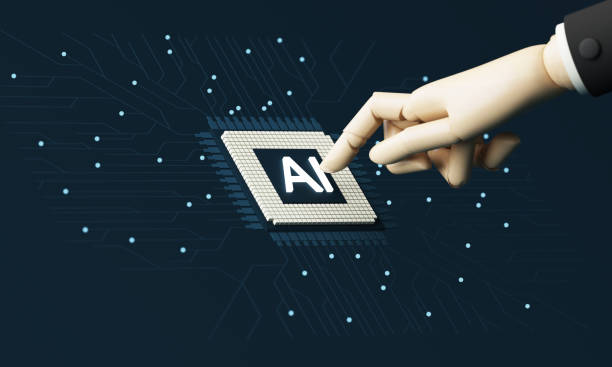What is Artificial Intelligence and How Does It Work?

#ArtificialIntelligence (AI) is a branch of computer science that deals with building machines capable of performing tasks that usually require human intelligence.
These tasks include learning, reasoning, problem-solving, understanding language, and recognizing patterns.
Artificial intelligence seeks to design systems that can learn from data, analyze experiences, and make logical decisions.
Artificial intelligence is generally divided into two main categories: Narrow AI, which is designed to perform a specific task, and General AI, which is capable of doing anything a human can do.
These systems use complex algorithms and mathematical models to process data and identify patterns in it.
For example, a facial recognition system using artificial intelligence can identify people’s faces in images.
Artificial intelligence is also used in various fields such as medicine, self-driving cars, and virtual assistants.
Machine Learning and Deep Learning are important sub-branches of artificial intelligence that allow machines to learn from data without explicit programming.
Are you worried about the low conversion rate of your online store and not achieving your desired sales?
Rasaweb is your specialized solution for having a successful online store.
✅ Significant increase in conversion rate and sales
✅ Professional and user-friendly design to attract customer satisfaction
⚡ Are you ready for a transformation in online sales? Get a free consultation!
Types of Artificial Intelligence: A Detailed Look at Classifications

Artificial intelligence can be categorized based on various criteria.
A common classification is based on their capabilities and applications.
In this classification, there are two main types: Narrow AI and General AI.
Narrow AI, also known as Weak AI, is designed to perform a specific task.
For example, a facial recognition system or a search engine are examples of Narrow AI.
These systems perform very well in the task for which they are designed, but they cannot perform other tasks.
In contrast, General AI, also known as Strong AI, aims to be able to do anything that a human can do.
This type of artificial intelligence is still in the early stages of development, and no complete General AI system has yet been built.
In addition, artificial intelligence can also be classified based on how it learns and functions.
For example, machine learning systems, deep learning systems, and rule-based systems are examples of this type of classification.
Applications of Artificial Intelligence in Today’s World + Table

Artificial intelligence is currently used in many different fields and has had a significant impact on our lives.
In medicine, artificial intelligence is used for disease diagnosis, drug development, and providing personalized healthcare.
In the automotive industry, artificial intelligence is used to develop self-driving cars and advanced driver-assistance systems (ADAS).
In finance, artificial intelligence is used for fraud detection, risk management, and providing personalized financial services.
In marketing, artificial intelligence is used to analyze customer data, deliver targeted advertising, and improve customer experience.
In addition, artificial intelligence is used in other fields such as education, manufacturing, and agriculture.
With the advancement of technology, it is expected that the applications of artificial intelligence will become wider and more diverse in the future.
| Area | Application |
|---|---|
| Medicine | Disease diagnosis, drug development, personal care |
| Automotive | Self-driving cars, ADAS |
| Finance | Fraud detection, risk management |
| Marketing | Targeted advertising, data analysis |
Advantages and Disadvantages of Artificial Intelligence from a Critical Perspective

Artificial intelligence, like any other technology, has its advantages and disadvantages.
The advantages of artificial intelligence include increased productivity, reduced errors, and improved quality of life.
Artificial intelligence can automate repetitive and tedious tasks, allowing humans to focus on more creative and important tasks.
Also, by analyzing large data sets, artificial intelligence can identify patterns that humans are unable to see, which can lead to better decisions and more accurate results.
But artificial intelligence also has disadvantages.
The disadvantages include job losses, algorithmic bias, and security concerns.
Artificial intelligence can automate many of the jobs currently performed by humans, which can lead to increased unemployment and social inequality.
Also, artificial intelligence algorithms can be trained on biased data, which can lead to discrimination against certain groups of people.
In addition, artificial intelligence can be used for malicious purposes such as cyber attacks and the production of fake news.
Are you tired of your company’s website not meeting your expectations? With Rasaweb, design a professional website that showcases the true face of your business.
✅ Increased acquisition of new customers and sales leads
✅ Increased credibility and trust of your brand with the audience
⚡ Get a free website design consultation!
What is the Difference Between Machine Learning and Deep Learning?

Machine Learning and Deep Learning are two related but distinct concepts in the field of artificial intelligence.
Machine learning is a general approach that allows machines to learn from data without explicit programming.
In machine learning, algorithms use training data to identify patterns and relationships in the data, and then use these patterns to make predictions or decisions about new data.
Deep learning is a subset of machine learning that uses artificial neural networks with multiple layers to learn from data.
These networks allow machines to identify more complex patterns in the data and achieve more accurate results.
In short, deep learning is a specific type of machine learning that uses deep neural networks to learn from data.
Ethical Challenges of Artificial Intelligence and Solutions to Deal with Them

The development and use of artificial intelligence have raised several ethical challenges.
One of the most important challenges is algorithmic bias.
Artificial intelligence algorithms can be trained on biased data and make decisions that are unfair or discriminatory.
To address this challenge, it is necessary to carefully review the training data and prevent any bias.
Also, algorithms should be designed to be transparent and explainable so that their decision-making process can be understood and, if necessary, corrected.
Another challenge is accountability.
If an artificial intelligence system makes a mistake and harms someone, who is responsible? The developer, the user, or the system itself? To solve this problem, it is necessary to enact laws and regulations that specify the responsibilities and duties of each party.
In addition, it must be ensured that artificial intelligence systems are designed to be safe and reliable.
What Does the Future of Artificial Intelligence Hold for Us? + Table

The future of artificial intelligence is very exciting and full of potential.
It is expected that artificial intelligence will play a more important role in our lives in the future and will create major changes in many fields.
For example, artificial intelligence can help us detect diseases earlier, develop new drugs, and provide better healthcare.
Also, artificial intelligence can help us develop safer and more efficient self-driving cars, reduce traffic, and control air pollution.
In addition, artificial intelligence can help us better understand the world around us, analyze large data sets, and identify new patterns.
However, the future of artificial intelligence also brings challenges.
We need to develop and use artificial intelligence carefully and cautiously and ensure that this technology is used for the benefit of all humanity.
| Area | Prediction |
|---|---|
| Medicine | Early detection of diseases, personalized treatments |
| Transportation | Safer and more efficient self-driving cars |
| Environment | Natural resource management, pollution reduction |
| Economy | Improved productivity, creation of new jobs |
Artificial Intelligence and Its Impact on the Labor Market

The impact of artificial intelligence on the labor market is a controversial topic.
Some believe that artificial intelligence will lead to job losses, while others believe that artificial intelligence will create new job opportunities.
The reality is that artificial intelligence can both eliminate jobs and create new jobs.
Jobs that are repetitive and routine are most at risk of being replaced by artificial intelligence.
In contrast, jobs that require creativity, critical thinking, and social skills are less at risk.
In addition, artificial intelligence can create new jobs in areas such as artificial intelligence development, data management, and cyber security.
To benefit from the advantages of artificial intelligence in the labor market, it is necessary to update our skills and prepare for the jobs of the future.
Are you falling behind in competition with large online stores?
Rasaweb, with its professional online store design, brings your business online and increases your market share!
✅ Increased brand credibility and customer trust
✅ Easy shopping experience leads to more sales
⚡ Take action now to receive a free website design consultation!
How to Learn Artificial Intelligence? A Step-by-Step Guide

Learning artificial intelligence can be a challenging but very rewarding process.
To begin, it is necessary to strengthen your math and computer science foundations.
Concepts such as linear algebra, calculus, probability, and statistics are essential for understanding artificial intelligence algorithms.
It is also necessary to become familiar with programming languages such as Python and R.
After strengthening the foundations, you can start learning the concepts and techniques of artificial intelligence.
Many educational resources are available, including online courses, books, and scientific articles.
Some popular online courses include Coursera, edX, and Udacity courses.
You can also use books and scientific articles to delve deeper into artificial intelligence topics.
After learning the concepts, you can start working on practical projects to strengthen your skills.
Artificial Intelligence in Iran: Current Status and Future Prospects
![]()
Artificial intelligence in Iran is a nascent and developing field.
In recent years, many efforts have been made to develop artificial intelligence in Iran, but there is still a long way to go to reach global standards.
The current status of artificial intelligence in Iran can be summarized as follows: a small number of companies and universities are active in the field of artificial intelligence, there is a shortage of specialists in the field of artificial intelligence, investment in the field of artificial intelligence is limited, and there are no suitable laws and regulations for the development of artificial intelligence.
However, the future prospects of artificial intelligence in Iran are bright.
The Iranian government has developed plans to support the development of artificial intelligence in the country.
Also, a large number of young Iranians are interested in learning artificial intelligence and are trying to become specialists in this field.
Given these factors, it is expected that artificial intelligence in Iran will make significant progress in the coming years and play a more important role in the economy and society.
FAQ
| Question | Answer |
|---|---|
| What is Artificial Intelligence? | It is the simulation of human intelligence in programmed machines to think like humans and imitate their actions. |
| What are the main branches of Artificial Intelligence? | They include machine learning, deep learning, natural language processing, computer vision, and robotics. |
| What is Machine Learning? | It is a branch of artificial intelligence that focuses on enabling systems to learn from data and identify patterns without explicit programming. |
| Mention examples of AI applications in our daily lives. | Voice assistants (such as Siri and Alexa), recommendation systems in Netflix and Amazon, self-driving cars, and facial recognition software. |
| What is Deep Learning? | It is a subset of machine learning that uses multi-layered (deep) artificial neural networks to process large amounts of data. |
| What is Natural Language Processing (NLP)? | It is a branch of artificial intelligence that focuses on enabling computers to understand, interpret, and generate human language. |
| What are some of the ethical concerns related to artificial intelligence? | They include data bias, privacy, job losses, and responsibility in the event of errors. |
| What are the main benefits of artificial intelligence? | Increased efficiency, improved decision-making, automation of repetitive tasks, and discovery of complex patterns in data. |
| How is artificial intelligence used in healthcare? | In disease diagnosis, drug discovery, medical image analysis, and personalized patient care. |
| How do you see the future of artificial intelligence? | It is expected to continue to develop at a rapid pace, affecting all aspects of human life, from industry to education and entertainment. |
And other services of Rasa Web Advertising Agency in the field of advertising
Intelligent conversion rate optimization: an exclusive service for growing website traffic based on custom programming.
Intelligent sales automation: a combination of creativity and technology for user interaction by optimizing key pages.
Intelligent customer journey map: Transform sales growth with accurate audience targeting.
Intelligent link building: a combination of creativity and technology to increase click-through rates through custom programming.
Intelligent digital advertising: an effective tool to increase sales by optimizing key pages.
And more than hundreds of other services in the field of internet advertising, advertising consulting, and organizational solutions
Internet advertising | Advertising strategy | Advertorial
Resources
Commentary on Artificial Intelligence and Its Challenges
,Artificial Intelligence Should Be Hoped For, But At What Cost?
,Artificial Intelligence and the Future of Organizations’ Opportunities
,What is Artificial Intelligence?
? For your business to leap into the digital world, Rasaweb Digital Marketing Agency, with expertise in areas such as WordPress website design, SEO, and content marketing, offers innovative and targeted solutions.
📍 Tehran, Mirdamad Street, next to the Central Bank, South Kazerun Alley, Ramin Alley No. 6




